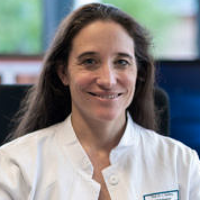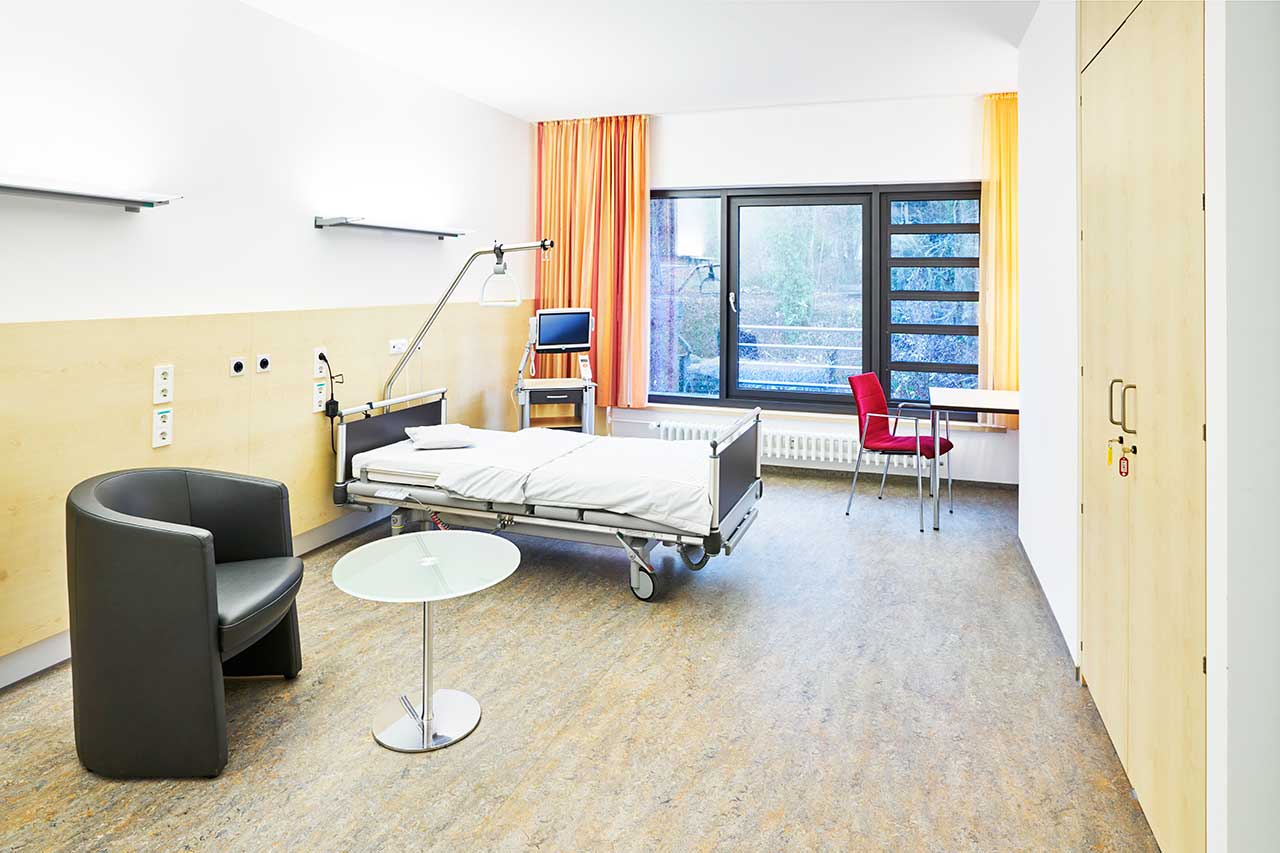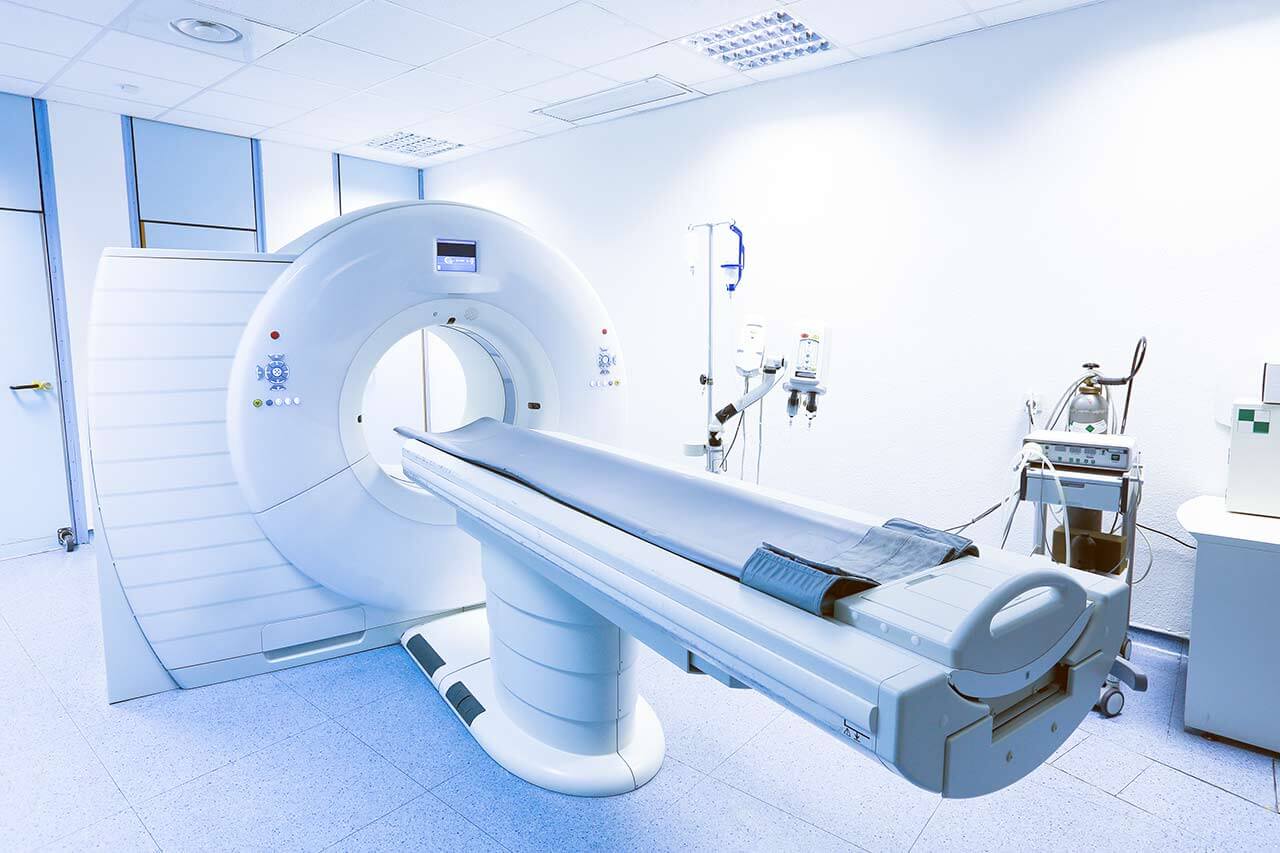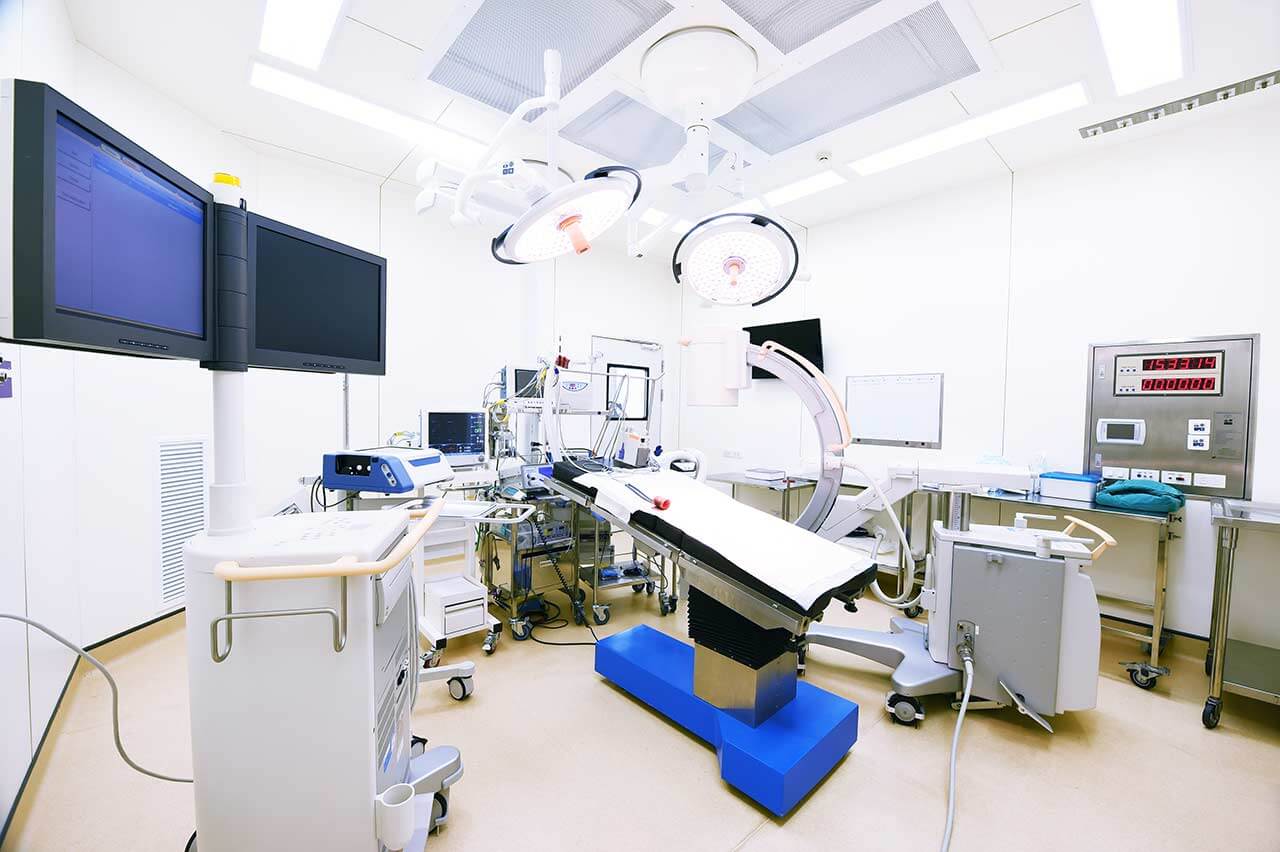
The program includes:
- Initial presentation in the clinic
- clinical history taking
- review of medical records
- physical examination
- dermatological skin examination
- laboratory tests:
- complete blood count
- biochemical analysis of blood
- inflammation indicators (CRP, ESR)
- tests for bacterial and fungal culture
- sebum secretion analysis
- differential diagnosis of other diseases of the skin
- nursing services
- consultation of related specialists
- treatment by chief physician and all leading experts
- explanation of individual treatment plan
Required documents
- Medical records
- Photo of the affected area(s) from different angles
Service
You may also book:
 BookingHealth Price from:
BookingHealth Price from:
About the department
The Department of Dermatology, Allergology and Andrology at the University Hospital Erlangen offers accurate diagnostics and effective treatment of diseases of the skin and its appendages, allergic reactions, as well as male infertility and erectile dysfunction. Priority is given to the diagnostics and treatment of skin tumors, inflammatory skin diseases, vitiligo, psoriasis, neurodermatitis and chronic non-healing wounds. Skin cancer therapy is carried out within a specialized Skin Cancer Center certified by the German Cancer Society. The department's dermatologists successfully apply conservative treatment methods (ointments, gels, pills), advanced laser technologies and surgical techniques. Every year, the department admits more than 3,000 inpatients and about 50,000 outpatients. Close interdisciplinary cooperation and the very latest infrastructure of the university hospital ensure the highest level of medical services and the best treatment results, thanks to which the department has an impeccable reputation throughout Europe and beyond. The department is headed by Prof. Dr. med. Carola Berking.
The main focus of the department's specialists is on dermatology. The first stage of the therapeutic process is a thorough study of the patient's medical history and examination, based on the results of which an accurate diagnosis is made and an effective treatment regimen is developed. The set of therapeutic measures is selected for each patient individually. Benign dermatological diseases are mostly treated with conservative methods and laser therapy. The department has at its disposal cutting-edge laser systems: Er:YAG and CO2 lasers, Er:YAG laser, diode laser, ruby laser, KTP/LBO laser and others. Laser therapy is successfully used to remove angiomas, hemangiomas, nevi, treatment of nail mycosis, hypertrichosis, hirsutism, hyperhidrosis, skin pigmentation disorders, scar revision and other pathological skin changes.
The department's medical team is distinguished by its special competencies in the treatment of skin malignant tumors. The most common among them are melanoma and basalioma. The department annually provides treatment to more than 1,200 patients suffering from melanoma. Malignant tumors are usually removed using microsurgical techniques. With appropriate clinical indications, surgical treatment can be complemented by chemotherapy and radiation therapy. If stage 3 and 4 melanoma is detected, it is possible to carry out innovative therapy using the patient's own dendritic cells. These cells are grown in vitro and are tumor antigens. The essence of the therapy is the targeted activation of antitumor immunity. Upon the completion of treatment, the patient can undergo plastic surgery to correct the consequences of the operation and restore an attractive appearance.
Many patients come to the department with suspected psoriasis, diagnostics and treatment of which are carried out within a specialized center. Psoriasis is one of the most common chronic inflammatory skin diseases. Many diagnostic and therapeutic procedures are performed on an outpatient basis, which eliminates the need for hospitalization. The specialists of the medical facility have at their command state-of-the-art equipment and use modern treatments, including their own developments, as well as local therapy and various types of systemic therapy. In special cases, patients can take part in clinical trials, during which innovative drugs that have not yet been approved for use in general clinical practice are applied.
A separate area of the department's clinical practice is the diagnostics and treatment of allergic diseases, including professional allergic reactions. The most common allergic diseases treated in the medical facility include neurodermatitis, hay fever, bronchial asthma, and contact eczema. The main treatment method for allergies in the department is allergen-specific immunotherapy (hyposensitization).
The specialists in the field of andrology carry out comprehensive diagnostics and treatment of male infertility. The doctors in this medical field also deal with the treatment of erectile dysfunction and carry out the procedure for semen cryopreservation.
The department's range of medical services includes the diagnostics and treatment of the following diseases:
- Diagnostics and treatment of diseases of the skin, its appendages
- Infectious skin diseases (bacterial, viral and fungal skin diseases, including HIV-related pathologies)
- Psoriasis
- Bullous dermatitis
- Papulosquamous dermatoses
- Neurodermatitis
- Urticaria and erythema
- Radiation-induced skin diseases
- Diseases of the skin appendages (hair, nails, sweat and sebaceous glands)
- Benign skin neoplasms (angiomas, hemangiomas, nevi, etc.)
- Malignant skin diseases (melanoma and basalioma)
- Chronic non-healing wounds
- Diagnostics and treatment of allergic diseases
- Neurodermatitis
- Hay fever
- Bronchial asthma
- Contact eczema
- Diagnostics and treatment of andrologic diseases
- Male infertility
- Erectile dysfunction
- Diagnostics and treatment of other diseases
Curriculum vitae
Since October 1, 2019, Prof. Dr. med. Carola Berking has been heading the Department of Dermatology, Allergology and Andrology at the University Hospital Erlangen. Prior to this position, she was a Managing Senior Physician in the Department of Dermatology and Allergology at the University Hospital of Ludwig Maximilian University of Munich – the largest Dermatology Center in all of Europe. Prof. Berking's key area of specialization is dermatologic oncology.
Dr. Carola Berking studied Human Medicine at the University of Saarland and at Ludwig Maximilian University of Munich. She received her doctorate at Ludwig Maximilian University of Munich. After a three-year research internship in Philadelphia, USA, in 2004 she completed her board certification in dermatology, and completed her habilitation in the treatment of malignant melanoma. In 2008, Dr. Berking was appointed as W2 Professor at Ludwig Maximilian University of Munich (specialization – dermatologic oncology).
Photo of the doctor: (c) Universitätsklinikum Erlangen
About hospital
According to the Focus magazine, University Hospital Erlangen ranks among the best medical facilities in Germany!
The hospital is one of the leading healthcare facilities in Bavaria and offers top-class medical care distinguished by the close intertwining of clinical activities with research and training of medical students. The hospital was founded in 1815 and today is proud of its rich traditions, numerous medical achievements and an excellent reputation not only in Germany, but also in the international arena. The hospital has 25 specialized departments, 7 institutes and 41 interdisciplinary centers, whose experts work tirelessly for the benefit of their patients.
The hospital has the status of a maximum care center, and therefore it represents almost all fields of modern medicine. Oncology, transplant medicine, and robot-assisted surgery are among the top priorities of the clinical activities of the medical complex. Oncology is represented by the Comprehensive Cancer Center Erlangen, which is one of 13 centers of excellence in Germany certified by the German Cancer Society. The university hospital has a high-tech center with high success rates for heart, liver, kidney, pancreas, cornea and bone marrow transplants. In addition, the hospital is a leader in the use of robot-assisted surgery. The medical facility has at its disposal innovative robotic technologies, in particular the da Vinci Surgical System, with the help of which surgeons perform many sparing interventions in various medical fields.
The medical team of the hospital consists of highly professional therapists, surgeons and nursing staff. The focus of their efforts is on the patient, his health and peace of mind, as well as comfort during treatment. The clinical practice of doctors is based on an individual approach to each case, which results in high treatment success rates. State-of-the-art technical equipment also plays an important role in the therapeutic process. The hospital is proud of the most advanced devices for imaging diagnostics (X-ray, ultrasound, CT, MRI, PET-CT, SPECT-CT, etc.), endoscopic examinations, laboratory tests, as well as specially equipped operating rooms for robot-assisted interventions, image-guided therapeutic manipulations, minimally invasive and classical surgeries of any complexity. Thus, the doctors of the university hospital have all the necessary resources to effectively treat the most severe pathologies and save lives.
The combination of high-tech equipment, experienced and highly qualified personnel, as well as strict adherence to the standards of modern medicine, form a solid foundation for the provision of the best medical care at the European level. An undeniable proof of the high prestige of the hospital is the constantly growing number of patients who come here from various regions of Germany and other countries of the world.
Photo: (с) depositphotos
Accommodation in hospital
Patients rooms
The patients of the University Hospital Erlangen live in comfortable rooms with light colors and modern design. Each patient room has an ensuite bathroom with shower and toilet. The furnishing of the patient room includes an automatically adjustable bed with an orthopedic mattress, a bedside table, a wardrobe, a table and chairs for receiving visitors, a TV, a radio and a telephone. Wi-Fi can be provided upon request. The use of a mobile phone is prohibited in many rooms of the hospital.
Patients can also live in enhanced-comfort rooms with a more sophisticated design. The enhanced-comfort rooms additionally include upholstered furniture, a minifridge and a safe.
Meals and Menus
The hospital offers healthy and tasty food distinguished by many awards, including the 1st place in the prestigious ESSEN PRO GESUNDHEIT competition of the Bavarian State Ministry of the Environment and Consumer Protection.
The patient and the accompanying person have three meals a day. Breakfast is served buffet style: scrambled eggs, boiled eggs, sausage, cheese, bread and buns with butter and jam, cereals, etc. There are three set menus for lunch and dinner to choose from: a classic menu featuring local cuisine dishes, a Mediterranean menu and a vegetarian menu.
If for some reason you do not eat all the foods, you will be offered an individual menu. Please inform the medical staff about your dietary preferences prior to the treatment.
The hospital also houses many cafeterias, which will delight with a wide range of delicious dishes and drinks.
Further details
Standard rooms include:
Religion
The hospital regularly hosts catholic and evangelical devine services. The services of representatives of other religions are available upon request.
Accompanying person
During an inpatient program, an accompanying person can stay with you in the patient room or in a hotel of your choice.
Hotel
During an outpatient program, you can stay in a hotel of your choice. The managers will help you choose the most suitable options.




